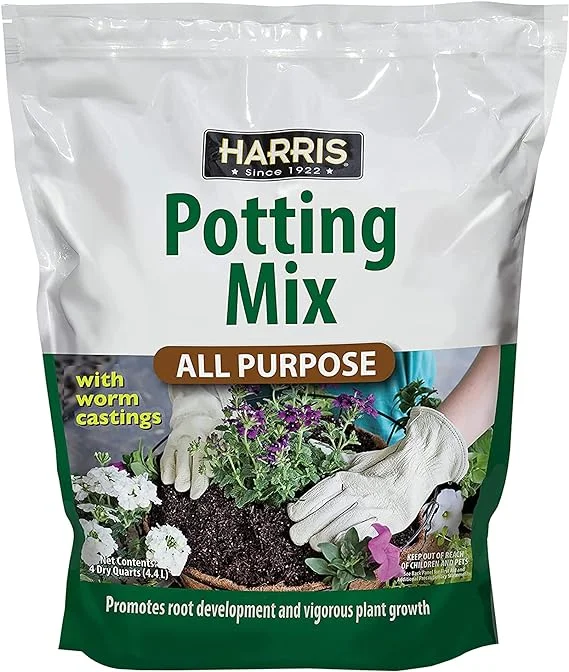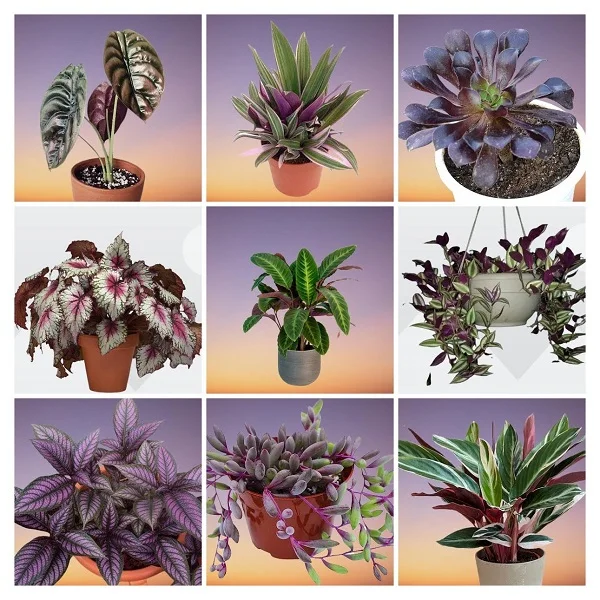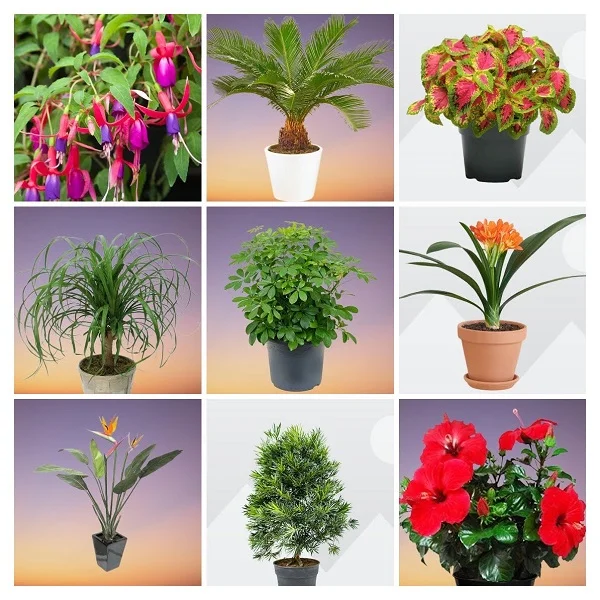Begonia Rex (Painted-leaf Begonia) Indoor Care, Propagation & Common Problems
Some links in this post may be affiliate links
Begonia Rex (Painted-leaf Begonia) prefers bright indirect light with some sunshine, warm and humid conditions, and moderately moist, rich, well-drained soil coupled with fortnightly feeding in the growing season.
Painted-leaf Begonia also called Fancy Leaf Begonia or Rex Begonia is among the popular Begonia varieties and is grown for its foliage display where the large, lop-sided, spectacular leaves occur in various hues which may be mixes of greens, silver, white, reds, pinks, yellow, purple, orange, maroon and others.
Fancy Leaf Begonia has a clumping growth habit with the foliage tightly packed together. The leaves arise from rhizomes and may be ruffled, puckered, spotted, streaked, waxy, smooth and so on. On account of its spectacular foliage, Painted-leaf Begonia is one of the most popular plants for the home.
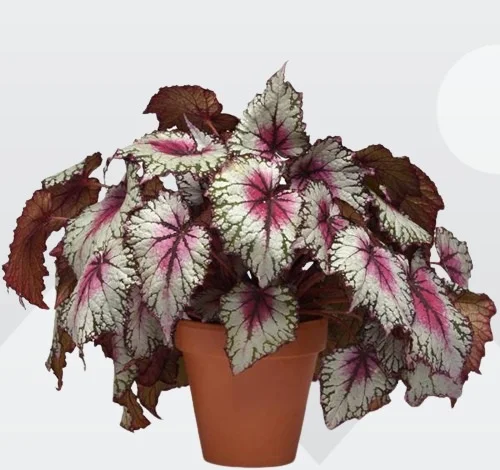
Botanical name: Begonia rex-cultorum
Family: Begoniaceae
Common names: Painted-leaf Begonia, Fancy Leaf Begonia, Rex Begonia
Origin
The original Begonia Rex originated from India but the species has been replaced by numerous hybrids like Merry Christmas, Silver Queen, Yuletide, Her Majesty among many others.
In their natural habitat Begonias grow as understory plants in moist shady to partially shady conditions in the tropical and subtropical regions in South and Central America, Africa and southern Asia. Fancy Leaf Begonia is one of the popular tropical foliage plants.
Size
Painted-leaf Begonia grows to a height of 1-2 feet and about the same width. It bears large lop-sided leaves about 6-12 inches long and 4-5 inches wide with a hairy leaf stalk.
Is Begonia Rex toxic?
Yes. Begonia Rex is toxic to pets as outlined by ASPCA. If the foliage is ingested it can cause burning in the mouth and throat, vomiting, diarrhea and abdominal pain.
The roots are highly toxic if ingested. If handled with bare hands, the sap may cause contact dermatitis. Therefore, always wear gloves when handling Painted-leaf Begonia.
Where to Buy
If you are looking to add this plant to your plant cllection, you may obtain Begonia Rex online on Amazon (Link to Amazon).
How to Care for Begonia Rex Indoors
To care for Begonia Rex indoors, provide bright indirect light with 4-6 hours of direct sunshine, warmth of 18-260C, humidity of 60-70% and moderately moist, rich, well-drained soil coupled with fortnightly feeding during the growing season.
Painted-leaf Begonia care needs repotting only when extremely pot-bound as it grows best when slightly root-bound. Regular pruning is required to keep it neat, to reduce pest infestations, to encourage a compact growth and to rejuvenate growth. Keep reading for a detailed account on the best growing conditions and how to provide them.
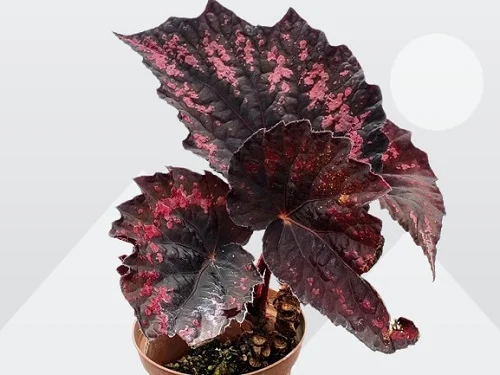
Light Requirements
Does Begonia Rex like sun or shade?
Begonia Rex grows best in bright indirect light with 4-6 hours of morning or late afternoon sunlight. Keep it away from hot midday sunshine to avoid scorching the leaves.
Where the lighting is not adequate, Fancy Leaf Begonia will become leggy and will not flower. Therefore, you may use full spectrum grow lights to supplement it.
Frequently turn the pot to ensure that the plant receives light on all sides for even growth and prevent legginess.
Watering
How often do you water Begonia Rex?
Water your Begonia Rex liberally in spring and summer but allow the soil to dry out slightly between waterings. Keep the soil moist but not soggy to avoid rotting, yellowing, and leaf drop.
Decrease watering in fall and winter to keep the soil slightly moist as growth is minimal at this time. Never allow the soil to dry out completely as it can lead to wilting, drooping, and leaf loss.
Only water with tepid water to avoid cold shock which can cause reduced growth and leaf fall. Use water that is free of chlorine and other dissolved chemicals to prevent browning of leaf tips and edges.
Painted-leaf Begonia cannot tolerate soggy soil as it can lead to root-rot disease and eventual death of the plant. Therefore, ensure that the pot has a drainage hole and the soil is free-draining to prevent waterlogging.
Avoid wetting the leaves during watering as it can lead to the rotting of the plant; you may water from the bottom instead.
Temperature & Humidity
Begonia Rex thrives in a warmth of 18-260C. It cannot tolerate temperatures below this range. Keep it away from drafts to prevent temperature flactuations which can result in stunted growth and leaf drop.
Painted-leaf Begonia requires a humidity of 60-70% for optimum growth. To raise humidity, group the plants together, set the pot on a wet pebble tray or use a cool mist humidifier.
Do not mist the Fancy Leaf Begonia as wetting the leaves may lead to fungal infestations. In addition, maintain a good air flow to discourage pests and diseases.
Fertilizer
Feed Begonia Rex every 2-3 weeks in spring and summer with a balanced, liquid fertilizer for a lush growth. Do not feed it in fall and winter as growth is minimal at this time, therefore, the plant does not need it.
Potting Medium
The best potting medium for Begonia Rex should be a rich, free-draining soil to prevent it from getting soggy while providing the required nutrients. A blend of 2 parts all purpose potting mix and 1 part perlite is ideal for this plant.
Repotting
Repot your Begonia Rex every year in the beginning of the growing season (spring to early summer), only if it is extremely pot-bound; it prefers to be slightly root-bound. One sign of a pot-bound plant is loss of leaf color.
Use a pot one size larger than the current one. Ensure that the pot has a drainage hole and the soil is well-draining to prevent waterlogging which can lead to rotting.
You may divide a large into several sections and pot each seperately for more plants. Check out these self watering planters on Amazon.
Pruning & Maintenance
Pruning Begonia Rex entails removal of yellow and dead leaves to keep the plant neat and reduce pest infestations. Pinch the growing tips regularly to encourage a compact growth.
Cutback the bare stems with a sharp, clean pair of pruning scissors at the beginning of the growing season (spring to early summer) to rejuvenate growth. The foliage emanating from the pruning can be used to propagate new plants.
Clean the leaves regularly by damp-wiping with a soft cloth to get rid of dust as well as reduce pest and disease infestations.
Rex Begonia Propagation
Rex Begonia (Painted-leaf Begonia) is propagated by plant division or from stem cuttings which can be rooted in water or in soil. The best to propagate is at the beginning of the growing season (spring to early summer) when in active growth to hasten establishment.
1. Rex Begonia propagation from stem cuttings in water
- Select a healthy stem (4–6 inches long) with at least two leaves and 2-3 leaf nodes.
- With a sterilized scissors cut just below a leaf node as this where new growth will come from.
- Strip off the lower leaves, leaving only the top ones.
- Dip the lower cut end in a rooting hormone to hasten establishment.
- Place the cuttings in a jar of plain water or in a propagation station. Change the water every 5-7 days.
- Position the set up in a warm, well-lit place away from direct sunlight to avoid scorching.
- When the roots are about 2-3 inches, transfer the cuttings into individual pots in moist, rooting soil.
- Maintain the soil moist until new growth emerges.
- Allow the new plant to be well established after which you can begin routine care.
2. Rex Begonia propagation from stem cuttings in soil
- Select a healthy stem (4–6 inches long) with at least two leaves and two leaf nodes.
- With a sterilized pruning scissors cut just below a leaf node as this where new growth will come from.
- Strip off the lower leaves, leaving only the top ones.
- Dip the lower cut end in a rooting hormone to hasten establishment.
- Fill a small pot (6-8 inches) with a well-draining rooting mix and moisten it slightly.
- Insert 2-3 inches of the lower cut end of the cutting in the moist rooting mix.
- Place the set up in a warm, well-lit place away from direct sunlight to avoid scorching.
- Maintain the soil moist until new growth emerges. Roots will develop in 2–4 weeks.
- Allow the new plant to be well established before transplanting after which you can begin routine care.
3. Rex Begonia propagation by plant division
- Divide a large plant into sections during repotting time while ensuring each section has some roots.
- Select a small pot with a drainage hole and fill it one thirdway with a well-draining soil. Moisten the soil lightly.
- Position the section in the center of the pot and continue covering the rootbase while firming the soil around it. Keep the section as the same soil level it was in the previous pot.
- Place the set up in a warm, well-lit place away from direct sunlight to prevent scorching.
- Maintain the soil moist through out until the new plant is well established.
- Allow the new plant to be well established after which you can begin routine care.
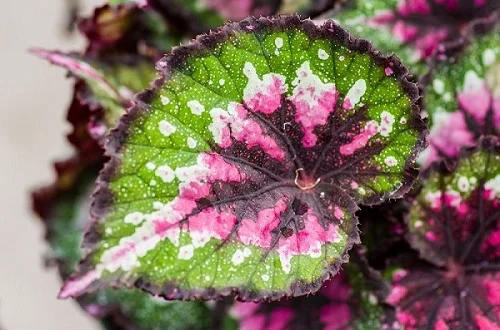
Begonia Rex Problems & Solutions
Begonia Rex (Painted-leaf Begonia) problems are plant dying, diseases and pests among others. Keep reading for more on these problems and their remedies.
Plant dying
Why is my Rex Begonia dying?
There are three possible reasons why your Rex Begonia is dying.
1. Stem-rot disease which is enhanced by soggy soil (too wet soil). Discard the affected plant to minimize spread to other plants as it cannot be saved.
2. Nematodes (root knot eelworm) which are characterized by swollen bumps on roots.
3. Vine weevil which is characterized by tunnels in the rhizomes.
White powdery spots
White powdery spots in Begonia rex are an indication of powdery mildew which is brought about by over damp conditions, low temperatures and poor air circulation.
How to fix it
- Isolate the affected plant and cut off the diseased leaves to minimize spread.
- Spray the plant with a systemic fungicide as per the manufacturer's instructions.
- Ensure that there is good air circulation for the plant to discourage the disease.
- Avoid wetting the foliage during watering or water from the bottom instead.
- Keep the plant away from cold drafts which cause sudden drops in temperatures.
Brown blotches which turn grey and moldy
Brown blotches which turn grey and moldy in Begonia Rex are an indication of botrytis disease which is promoted by overwet conditions coupled with poor ventilation.
How to fix it
- Isolate the affected plant and cut off the diseased parts.
- Spray the plant with a systemic fungicide. Ensure all the parts of the plant are well covered with the fungicidal solution.
- Use a well-drained soil and a pot that has a drainage hole.
- Maintain good air circulation for the plant to discourage the disease.
Pests
Begonia Rex is prone to spider mites and aphids.
How to fix it
- Isolate the affected plant to prevent spread to the other plants.
- Treat the plant with neem oil or an insecticidal soap. Ensure to follow the manufacturers' instructions on the label.
- Regularly damp-wipe the leaves with a soft cloth to discourage the pests.
- Maintain the plant well pruned to discourage the pests.
- Set the pot on a wet pebble tray or group the plants together to raise humidity to minimize the pests infestations.
You liked it? Share on social media.
Related Content
Amazon Associates Disclosure
Homeplantsguide.com is a participant in the Amazon Services LLC Associates Program, an affiliate advertising program designed to provide a means for sites to earn advertising fees by advertising and linking to amazon.com.
